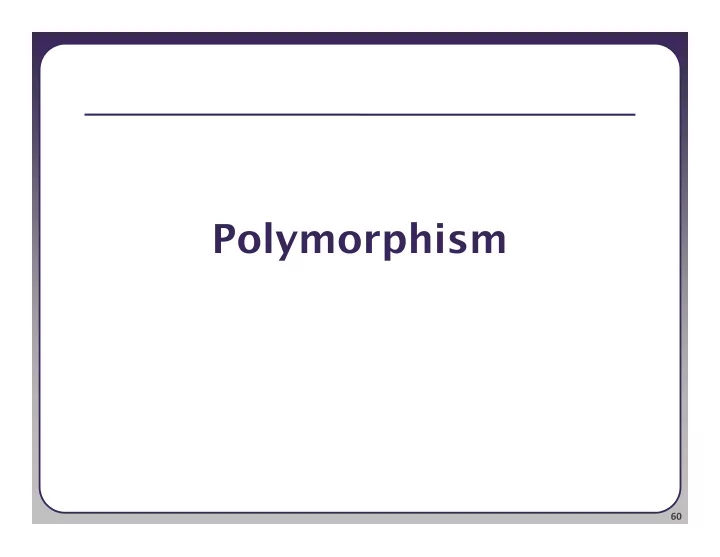

������������ 60
������������ Definition Ability for different types of objects to feature their own version of a method – i.e. name + return type + parameters – which each behave differently Replaces a switch on the object’s type � Pseudo Code switch (o.type){ case Employee: o.work(); break ; case Lawyer: o.sue(); break ; case Secretary: o.report(); break ; } 61
����������������������������� � A variable of type T can hold an object of any subclass of T . Employee ed = new Lawyer(); • E.g • ed � Lawyer • ed � LegalSecretary � You can call any methods from the Employee class on ed . � When you do, it uses the overridden version, if any, in order to behaves as the subclass; e.g. Lawyer System.out.println( ed.getSalary() ); // 50000.0 System.out.println( ed.getVacationForm() ); // pink 62
��������� ����������������������� Arrays of superclass types can store any subtype as elements. public static void main(String[] args) { Employee[] e = {new Lawyer(), new Secretary(), new Marketer(), new LegalSecretary()}; for (int i = 0; i < e.length; i++) { System.out.println("pay : " + e[i].getSalary() ); System.out.println("vdays: " + e[i].getVacationDays() ); System.out.println(); ? } Side note: What } does this look Output: like in memory? pay : 50000.0 pay : 60000.0 vdays: 15 vdays: 10 pay : 50000.0 pay : 55000.0 vdays: 10 vdays: 10 63
���������������������������������� ? Everyone comfortable with this representation? e Lawyer Object Secretary Object Marketer Object LegalSecretary Object Employee[] e = { new Lawyer(), new Secretary(), new Marketer(), new LegalSecretary()}; 64
���������������������������������� ? Everyone comfortable with this representation? e Array object Lawyer Object Secretary Object Marketer Object LegalSecretary Object Employee[] e = { new Lawyer(), new Secretary(), new Marketer(), new LegalSecretary()}; 65
���������������������������������� ? Everyone comfortable with this representation? Array object e Lawyer Object Secretary Object Marketer Object LegalSecretary Object Employee[] e = { new Lawyer(), new Secretary(), new Marketer(), new LegalSecretary()}; 66
����� !�"#��������������� ����$������������������� A variable can only call that type's methods, not a subtype's. Employee ed = new Lawyer(); int hours = ed. getHours (); // ok; in Employee ed.sue(); // compiler error Java’s reasoning = variable ed could store any kind of employee not all kinds know how to sue 67
%�������������������&$������������' A variable can only call that type's methods, not a subtype's. Employee ed = new Lawyer(); int hours = ed. getHours (); // ok; in Employee ed.sue(); // compiler error Java’s reasoning = variable ed could store any kind of employee not all kinds know how to sue To use Lawyer methods on ed , we can type-cast it. Lawyer theRealEd = (Lawyer) ed; theRealEd.sue(); // ok ((Lawyer) ed) .sue(); // shorter version 68
(���������&��$��������&���� • The code crashes if you cast an object too far down the tree. Employee eric = new Secretary() ; ((Secretary) eric).takeDictation("hi"); // ok ((LegalSecretary) eric).fileLegalBriefs(); // error // (Secretary doesn't know how to file briefs) • You can cast only up and down the tree, not sideways. Lawyer linda = new Lawyer(); ((Secretary) linda).takeDictation("hi"); // error ! • Casting doesn't actually change the object's behavior. It just gets the code to compile/run. ((Employee) linda) .getVacationForm() // pink 69
���)��* � +��,������-.�������/ ? import java.util.*; What’s class A { displayed? public String f(){return "A";} ! } B public class B extends A { public String f(){return "B";} public static void main(String[] args){ B b = new B(); A a = (A) b; System.out.println(a.f()); } } http://stackoverflow.com/questions/22874640/overriding-methods- in-java-and-then-casting-object-to-parent-class-behavior 70
Recommend
More recommend